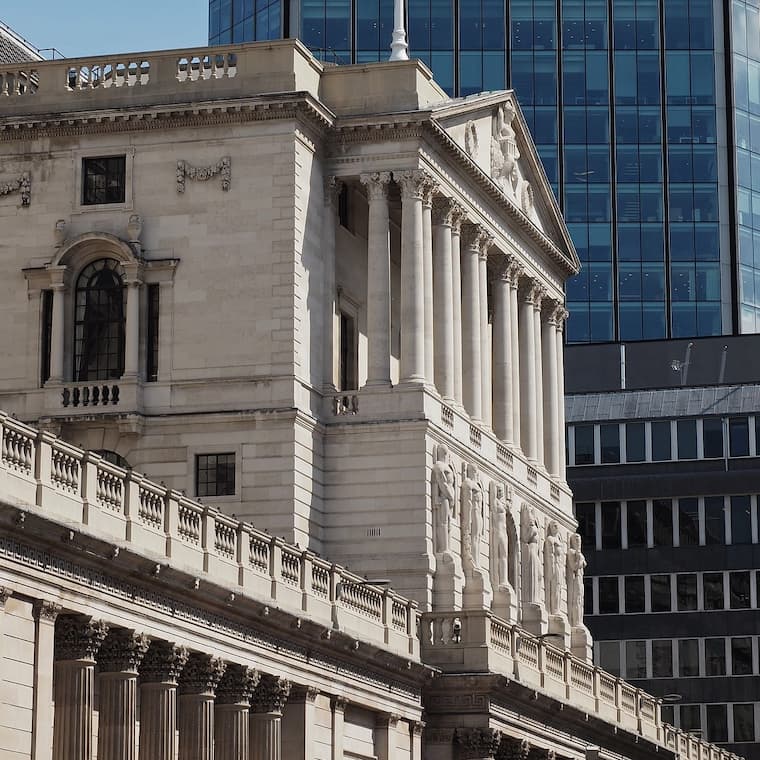Strategy
Wealth Managers React To UK Interest Rate Freeze

After the Bank of England Monetary Policy Committee decided to keep interest rates at current levels late last week, wealth managers discuss the impact and the timing of a potential rate cut.
Last Thursday, the Bank of England's Monetary Policy Committee (MPC) decided to hold interest rates at 5.25 per cent, which was expected by the market.
The committee voted 7 to 2 to hold rates steady, with the dissenters preferring a cut of 0.25 per cent to 5 per cent. Inflation is expected to return to around the 2 per cent target in the coming months and to 1.9 per cent in 2026.
Although Bank of England boss Andrew Bailey said it was encouraging news on inflation, currently at 3.2 per cent, he would need more evidence that it would stay low before cutting rates. Economic growth, however, stood at 0.4 per cent for the first three months of 2024 and expected to decelerate to 0.2 per cent from April to June [2024], sparking concern from some wealth managers that the BoE is moving too slowly. It has also raised speculation that rates could be cut in August.
Here are some reactions from wealth managers to the decision.
Isabel Albarran, investment officer at Close Brothers
Asset Management
“On our MPC checklist ahead of the meeting were: a dovish shift
in votes, an update to the guidance, and for the new CPI
forecast, conditioned on the market path for rates to be below 2
per cent at the end of the forecast. We scored 2/3: one more
member voted for cuts and CPI is expected to average 1.5 per cent
in 2026. However, the guidance was mostly unchanged. While the
statement did reiterate that “the stance of monetary policy could
remain restrictive even if the bank rate were to be
reduced,” the commentary highlights that some members need
more evidence before committing to cuts. Futures markets
currently imply a first cut in August, while, at the press
conference, Bailey said June hadn’t been ruled in or out. Given
the need for greater certainty for several members, we think
August is more likely.”
Nicholas Hyett, investment manager at Wealth
Club
“The Bank of England continues to diagnose persistent inflation
as the major danger facing the UK economy. However, it is an
increasingly delicate balancing act, and there’s a real risk the
economic cure might end up being worse than the disease. To
be fair the picture is murky. The market expects Friday’s GDP
data to show the UK returned to growth in the first quarter,
ending last year’s short-lived recession. But a 12 per cent cut
in the energy price cap will probably drag inflation back below
the bank’s 2 per cent target this month – at least temporarily.
The former suggests interest rates are just fine where they are,
the second that rates could do with a trim. The result is a
natural inclination to sit on the fence a little longer,
especially since cutting too early risks sinking sterling and
kick-starting another bout of inflation. Leave interest rate cuts
too late though, and the Bank risks accidently cratering the
economy in its eagerness to get inflation under control. The
MPC’s two dissenters clearly think that risk is growing."
Julian Jessop, economics fellow at the free market think
tank, the Institute of Economic Affairs
"The Monetary Policy Committee left rates on hold this week, as
expected, but there are some clear signals that cuts are coming
soon. For a start, Dave Ramsden joined Swati Dhingra in voting
for an immediate cut. This means that only three of the other
seven members need to switch camp. Moreover, the Bank
lowered its medium-term inflation forecasts, with the two-year
projection now slightly below the 2 per cent target. Crucially,
this forecast is based on market expectations for the path of
interest rates, which assume some quite large cuts. Finally,
the statement included some new language which emphasised the
importance of the ‘forthcoming data releases.’ With two sets
of price and labour market releases between now and the next
meeting in late June, rates could be cut next month, or in August
at the latest. The Bank is still moving too slowly for comfort.
But the MPC does at least seem to be paying more attention to
developments in broad money and credit, which may now play a
bigger part in decision making. Better late than never."
Hetal Mehta, head of economic research at St James’s
Place
“The BoE’s vote split was no surprise after the dovish speech
Dave Ramsden gave recently. It’s clear the BoE has an easing bias
as they continue to look for confirmation that inflation is
moderating. We think many indicators of inflation will not give
that confirmation in the near term and any expectations of a rate
cut in June would be premature as base effects will only
temporarily get inflation down to target.”
Jonny Black, chief commercial and strategy officer
at abrdn adviser
“The Bank’s decision today dashes hopes that May would see the
start of rates unwinding. Caution is the MPC’s byword. It
won’t be rushed into what it might view as a hasty decision if it
still thinks inflationary pressures are too high and there’s a
risk of price rises accelerating again. One factor that might
currently be giving it pause for thought is the recent National
Living Wage rise. Ratesetters will want to make sure that the
impact of this is known before moving ahead with a
reduction. Advisors have a critical role to play in
helping clients make sense of the wider economic context that the
Bank is operating in, and to help reassure them that their
strategies are prepared to keep delivering good outcomes when
rates do eventually start coming down.”